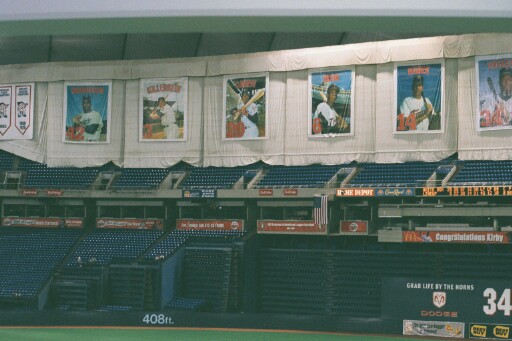 |
IT MAKES NO SENSE:
Small Market Teams & New Stadiums

|
| The
Metrodome suits the Twins perfectly. |
Commissioner Bud Selig recently claimed that six to eight
major league teams are in danger of going out of business within the next year and a half. Of course Selig, the master of
the vague threat, didn't bother to discuss such nonessential items as which teams and why. But, one thing is apparent - a
brand new, half billion dollar stadium would cure all of their ills. Upon closer examination, however, it really doesn't make
sense under baseball's current system to build these ornate, frivolous ball parks for baseball's paupers.
If a family
of four had fallen on hard times, possibly needing government assistance, would we build them a mansion to get them back on
their feet? Of course not, we'd set them up in a simple, yet functional apartment or starter home. Stadiums like the Metrodome,
Riverfront (aka Cinergy), Jack Murphy (Qualcom), and Kauffman, etc. are the equivalent of that - they are all these teams
need at the moment. Unless the owners and players can agree on a more equitable system (don't hold your breath), it is foolish
to invest hundreds of millions of dollars into these teams.
Look at the situation in Milwaukee, it is becoming more
and more embarrassing by the minute for Bud Selig. Sure the Brewers had fantastic attendance and made money last season, their
first in Miller Park, but this year they are lucky to draw 20,000 to watch their miserable team. Wouldn't the Brewers be better
off in the low budget, already paid off County Stadium? Miller Park's roof doesn't work, and even when the stadium is at it's
best, it hardly has a quarter of the baseball atmosphere of County Stadium.
When the funding for Miller Park was approved,
the Brewers promised their payroll would not drop below $50 million. Yes, that's a raise from what is was throughout the 1990s,
but it is still not even close to competitive to the large market teams, and hardly ensures the team will be consistently
competitive.
In contrast, look at the the Brewer's neighbors to the west, the Minnesota Twins. The Twins play in the
dreary Metrodome, but they are not in over their heads. They make a little money or break even yearly, their payroll is similar
to Milwaukee's, and their attendance is comparable with Milwaukee's even though the Brewers should still be in the honeymoon
period with their new park. Ideally the Twins would have a much better stadium, but they are a small market, no-nonsense,
build-from-withtin, organization; the Metrodome is practical for them.
Don't get me wrong, the folks in Minnesota
are not satisfied with the Metrodome, I just think they should be. Now that Bud Selig has put the contraction gun to their
head, the Minnesota State Legislature actually passed a stadium bill (a very incomplete one, but after six years of frustration,
it's a step). The Twins say their very existence depends on whether or not a new ball park is built. Under the current system
however, it will just be a very expensive quick fix.
The Twins are a competitive team now, and they claim the extra
revenue brought in by a new stadium will help them sign their young players when they become eligible for free agency instead
of losing them to large market teams. But the stadium bill will also require the team to put down $120 million cash up front.
Where does that money come from? If that much cash is available, why do they need more revenue to sign their players? Even
if the situation does work out like they hope, and more revenue is produced, what happens when teams like the Yankees start
throwing $100 million contracts at players like Torii Hunter - the Twins will lose them - regardless of what stadium they
are playing in.
Unless baseball comes up with a new economic system, it doesn't make sense for small market teams
to build new stadiums. Bud Selig has used this contraction threat to force teams' hands and hold the fan's hostage. The players
and owners have no impartial leader, aka a real commissioner, to step in and help them settle their differences, so it is
simply asinine to expect the public to invest in their sinking ship. This is very sad, but also very true.
-David Zingler
*Click here for FEEDBACK*
BACK to simply-BASEBALL-notebook.com
|
 |

